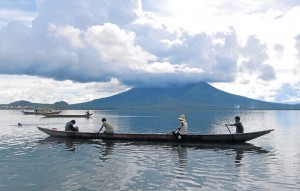MANILA, Philippines — Camarines Sur, now more popularly referred to as “CamSur” particularly by the youth, has edged out Metro Manila as the top tourist stop in the Philippines.
This, according to the National Statistical Coordination Board (NSCB) report using data from the Department of Tourism’s (DOT) regional offices.
In 2010, CamSur overtook Metro Manila and Cebu as the top tourist destination in the country with a total of 2.33 million visitors, the NSCB said. Metro Manila was second place with almost 2.3 million visitors and Cebu was third with 1.77 million visitors.
In 2009, CamSur was the third top destination with 1.56 million visitors. Metro Manila was first with 1.9 million visitors and Cebu was second with 1.6 million visitors.
In 2008, Camsur only had 721,024 visitors while Metro Manila had 1.35 million visitors and was the number two destination nationwide. Cebu was number one for that year with almost 1.6 million visitors. Baguio City was number three with 814,975 visitors.
However, over a three-year period from 2008 to 2010, Metro Manila still attracted the most number of visitors in the Philippines at 5.6 million, the NSCB said. Cebu was second with almost 5 million visitors and Camsur was third with 4.6 million visitors.
For the same three-year period, Metro Manila had the lead over Cebu, Camarines Sur, Baguio City, and Boracay among the top five visitor draws in the Philippines.
The NSCB noted positive developments in other destinations as well. The statistical agency said the growth rate of foreign visitor arrivals in Boracay and Palawan in 2010 was higher than in Bali, Indonesia, which is an internationally well-known tourism destination. The NSCB said this comparison came from data from DOT Region VI and from Bali’s immigration statistics.
The decelerated growth of visitor arrivals in Bali for 2005 and 2006 may be attributed to the 2005 Bali bombings as well as several travel warnings against non-essential trips to Indonesia, the NSCB said.
However, in terms of visitor numbers for the year, Boracay and Palawan received only 10.9 percent and 5 percent, respectively, of the foreign visitors received by Bali.
For the period 2000 to 2010, foreign visitors on the average stayed for nine nights while overseas-based Filipinos stayed for an average of 19 nights, the NSCB said, citing visitor sample surveys. However, the averages for 2009 and 2010 were generally less than those for 2001 to 2008.
Over the last decade, a tourist spent around $90 per day on the average, the NSCB said. Out of the average daily expenditure, about 33.2 percent was spent on accommodation, 22.8 percent on food and beverages, and 21.4 percent on shopping.
Foreign visitors spent mostly on accommodation while balikbayans (visiting overseas Filipinos) splurged mainly on Shopping. “If we want to generate income from tourism, our entrepreneurial choices are clear!” the NSCB said.
Tourism is one of the priority sectors in the Philippine Development Plan, which says the domestic economy must grow at a rate of 7 to 8 percent per year in the medium term (2010 to 2016) to curb poverty.
